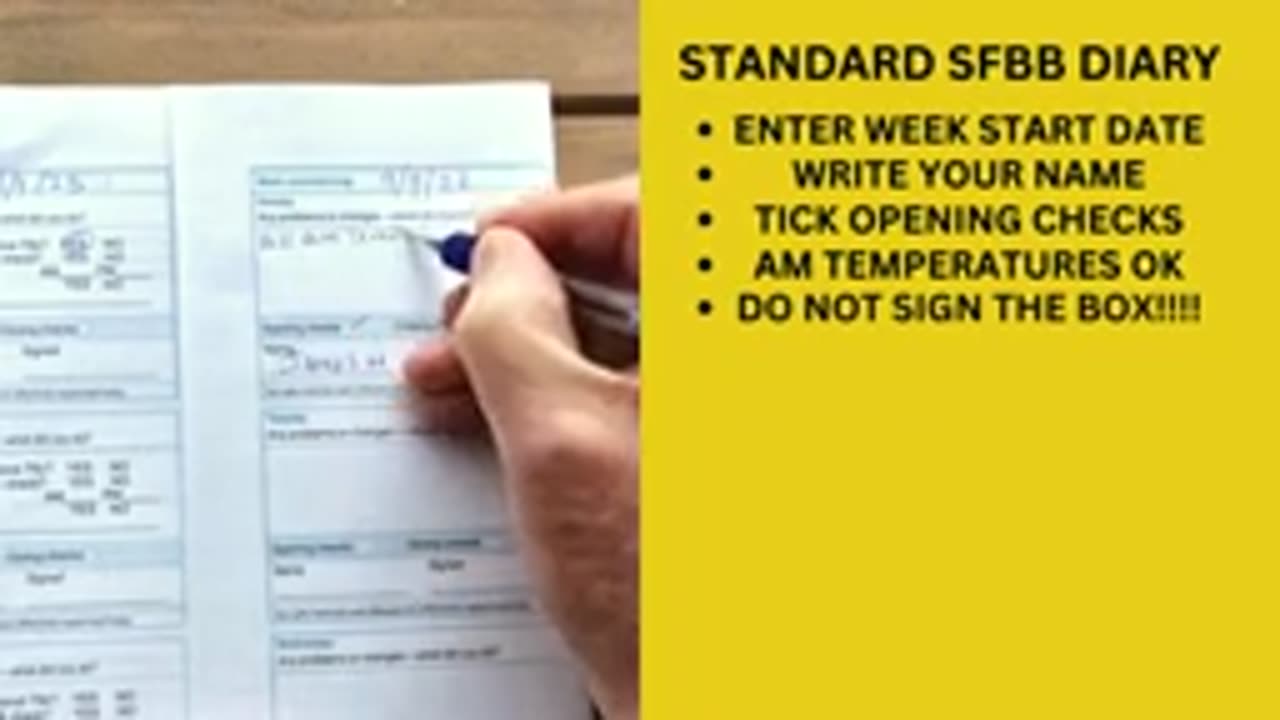Premium Only Content

How to fill The SFBB Pack Daily Diary by SFBB Training UK_2
### **How to Fill the SFBB Pack Daily Diary: SFBB Training UK (Part 2)**
The **Safer Food, Better Business (SFBB)** Daily Diary is a crucial tool for food safety management. It helps food businesses comply with regulations and maintain high standards of hygiene and food safety. Properly filling out the **Daily Diary** ensures consistent tracking of essential tasks such as food storage, temperature monitoring, cleaning routines, and staff hygiene. Below is an expanded guide for filling out the diary, including key points to follow and best practices.
---
### **Key Sections of the SFBB Daily Diary**
#### **1. Temperature Monitoring and Checks**
This section ensures that your kitchen maintains the correct temperature for food storage, preparation, and cooking.
##### **What to Record:**
- **Chilled Storage (Fridge)**: Ensure the temperature is below **5°C**.
- Record the temperature of your fridges at least once a day. Example: "Fridge 1: 4°C."
- **Frozen Storage (Freezer)**: Ensure the temperature is below **-18°C**.
- Record the temperature of your freezers at least once a day. Example: "Freezer 2: -20°C."
- **Hot Holding**: Ensure food is being kept at or above **63°C** (e.g., for soups, hot plates).
- Record the temperature of hot holding units, such as heated food displays, twice a day (before service and during).
- Example: "Hot holding unit: 70°C."
##### **Why It’s Important:**
- **Temperature control** is critical to prevent foodborne illnesses. Foods outside the safe temperature range (either above or below the specified range) can promote bacteria growth.
---
#### **2. Food Preparation and Cooking Checks**
This section tracks important safety checks around the food preparation and cooking process, ensuring food is handled and cooked at safe temperatures.
##### **What to Record:**
- **Cooking Temperatures**:
- Cook foods to the correct internal temperature to kill harmful bacteria.
- Example: "Chicken: 75°C."
- **Food Preparation**:
- Record cleaning and sanitizing of surfaces and equipment used during food prep.
- **Note** any cross-contamination risks (e.g., raw meat on chopping boards).
##### **Why It’s Important:**
- Proper cooking temperatures ensure bacteria like **Salmonella**, **E. coli**, and **Campylobacter** are killed during preparation, preventing foodborne illness outbreaks.
---
#### **3. Cleaning and Hygiene Activities**
Recording your kitchen's cleaning routines ensures that hygiene is maintained to a high standard.
##### **What to Record:**
- **Surface Cleaning**: Document when surfaces such as countertops, cutting boards, and cooking areas are cleaned.
- **Equipment Cleaning**: Record when equipment like knives, mixers, and utensils are sanitized.
- **Waste Management**: Record when waste bins are emptied and cleaned, ensuring no accumulation of waste that could lead to contamination.
##### **Why It’s Important:**
- Cleaning is essential to remove dirt, food residue, and bacteria, preventing cross-contamination and maintaining food safety.
---
#### **4. Stock Rotation and Storage Checks**
Record the stock rotation process, ensuring that food is used in the proper order to minimize spoilage and waste.
##### **What to Record:**
- **Stock Rotation**: Ensure that older stock is used before newer stock (FIFO or FEFO system).
- Example: "Use-by date on raw chicken: 26/12/2024 – FIFO in fridge."
- **Stock Storage Temperature**: Check and record storage conditions for refrigerated and frozen food.
- Example: "Raw fish: Stored at -18°C."
##### **Why It’s Important:**
- Proper stock rotation ensures food is used before it reaches its **use-by date**, reducing waste and the risk of serving expired food.
---
#### **5. Personal Hygiene and Staff Checks**
In this section, record staff hygiene practices to ensure proper handwashing, clean clothing, and health protocols are followed.
##### **What to Record:**
- **Handwashing**: Ensure that all staff wash their hands regularly, especially after handling raw food.
- Example: "Staff member (John): Washed hands after handling raw meat."
- **PPE (Personal Protective Equipment)**: Ensure staff are wearing the correct protective equipment (e.g., gloves, aprons, hairnets).
- **Illness Monitoring**: Record any instances where staff are ill and unable to work due to foodborne illness symptoms (e.g., vomiting, diarrhea).
- Example: "Staff member (Sally): Off sick – Notified supervisor."
##### **Why It’s Important:**
- Proper personal hygiene prevents the spread of bacteria and allergens, ensuring safe food handling and minimizing the risk of foodborne illnesses.
---
#### **6. Pest Control Checks**
Record any pest control measures and inspections to ensure your kitchen is free from pests like rodents, flies, or insects.
##### **What to Record:**
- **Pest Control Inspections**: Record when inspections are done, looking for signs of pests and taking action if necessary.
- Example: "Pest control check: No signs of pests observed."
##### **Why It’s Important:**
- Pests can contaminate food with harmful bacteria and pathogens, so regular checks and control measures are essential.
---
#### **7. Allergen Management and Checks**
Allergen management is essential for preventing cross-contact between allergens and other food items.
##### **What to Record:**
- **Allergen Management**: Record any actions taken to ensure allergens are managed correctly, such as cleaning between tasks and using designated utensils for allergenic foods.
- Example: "Handled nuts on separate chopping board – Cleaned board after use."
- **Allergen Labels**: Ensure allergen information is correctly labeled on all food items served to customers.
##### **Why It’s Important:**
- Preventing cross-contamination of allergens is critical for customers with food allergies, helping avoid severe allergic reactions.
---
### **Best Practices for Filling the SFBB Daily Diary**
- **Consistency is Key**: Fill out the diary at the same time each day, ensuring that all tasks are recorded accurately.
- **Be Thorough**: Always complete every section of the diary, even if no issues are reported. This shows diligence and attention to food safety.
- **Monitor Temperature Regularly**: Temperature checks should be recorded throughout the day to ensure consistent food safety practices.
- **Staff Accountability**: Ensure that everyone in your team understands their responsibilities for completing specific sections of the diary.
- **Review and Sign Off**: A supervisor or manager should review the diary daily to confirm that all tasks are completed and accurate, and sign off on the diary for accountability.
---
### **Benefits of a Well-Filled SFBB Daily Diary**
- **Legal Compliance**: Ensures compliance with UK food safety regulations and supports achieving a good **Food Hygiene Rating**.
- **Audit Trail**: Provides an audit trail for inspectors to review during inspections.
- **Improved Food Safety**: Helps identify and address issues before they become major problems, ensuring your kitchen operates safely.
- **Promotes Accountability**: Assigning specific tasks and monitoring ensures that staff are following food safety practices consistently.
---
Would you like further assistance with a **custom SFBB Daily Diary** template or additional tips on food safety management?
-
 7:58
7:58
HSESafetyInformation
17 days agoAuthentic Peshawari Rosh _ Namkeen Gosht Recipe __ Traditional KPK and Baluchistan
461 -
 47:50
47:50
Candace Show Podcast
5 hours agoBREAKING: Judge Makes Statement Regarding Taylor Swift's Text Messages. | Candace Ep 155
94.3K102 -
 DVR
DVR
Josh Pate's College Football Show
2 hours agoCFB’s Most Hated Teams | FSU & Clemson Future | Big Ten Win Totals | Star Rankings Overrated?
5.76K -
 1:33:47
1:33:47
CatfishedOnline
4 hours agoGoing Live With Robert - Weekly Recap
19.4K -
 55:18
55:18
LFA TV
1 day agoEurope’s Sudden Turn Against America | TRUMPET DAILY 3.6.25 7PM
25.5K3 -
 4:21
4:21
Tundra Tactical
3 hours ago $1.38 earnedPam Bondi MUST Enforce Due Process NOW!
18.4K1 -
 56:42
56:42
VSiNLive
5 hours agoFollow the Money with Mitch Moss & Pauly Howard | Hour 1
43.6K1 -
 1:05:32
1:05:32
In The Litter Box w/ Jewels & Catturd
1 day agoShalom Hamas | In the Litter Box w/ Jewels & Catturd – Ep. 756 – 3/6/2025
98.7K37 -
 1:23:00
1:23:00
Sean Unpaved
6 hours ago $2.98 earnedNFL Free Agency
50.9K3 -
 18:25
18:25
Stephen Gardner
5 hours ago🔥The REAL REASON the Epstein Files are being HIDDEN | I CONFRONT Alan Dershowitz for details!
63.3K109